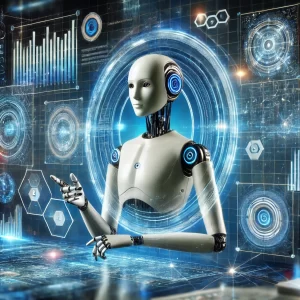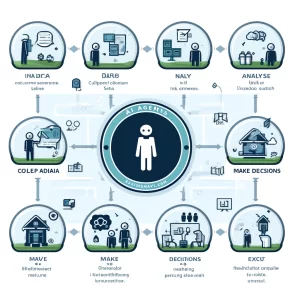Introduction: What Are AI Agents?
Artificial Intelligence (AI) is reshaping industries at an unprecedented pace, and one of the most exciting developments in this field is the rise of AI Agents. These intelligent, autonomous systems are designed to execute tasks and make decisions with minimal human intervention. AI agents are transforming industries by streamlining processes, improving efficiency, and providing valuable insights that were previously unattainable. But what exactly are AI agents, and how do they work? In this post, we will explore their capabilities, applications, and the impact they are having on various sectors.

What Exactly Are AI Agents?
AI agents, also referred to as intelligent agents or autonomous agents, are software programs designed to autonomously carry out tasks by perceiving their environment, making decisions, and acting based on those decisions. These agents can operate in a wide range of scenarios, from simple automated tasks like sorting emails to more complex activities such as analyzing data for predictive insights.
AI agents are powered by machine learning (ML) and deep learning algorithms, which allow them to “learn” from data and experiences, thus enhancing their performance over time. As they process more information, AI agents become smarter and more efficient, adapting to changes in the environment and improving their decision-making.
The Role of AI Agents in Various Industries
AI agents have found applications across a wide variety of industries. Let’s look at some of the most prominent sectors where these agents are making a significant impact.
1. AI Agents in Healthcare
The healthcare sector is experiencing a transformation with the help of AI agents. These intelligent agents are assisting doctors in diagnosing diseases, suggesting treatments, and managing patient data. AI-powered virtual assistants can schedule appointments, remind patients about medication, and provide personalized health advice.
Subheading – AI Agents in Diagnostics
AI agents can analyze medical images, detect anomalies, and suggest diagnoses that might be missed by human doctors. The use of AI in diagnostic tools, such as radiology scans, is revolutionizing medical practice.
Subheading – Virtual Health Assistants
AI-powered virtual assistants are helping patients manage their health and improving patient care by providing instant access to medical information and support.
2. AI Agents in Finance
In the financial sector, AI agents are being utilized to automate repetitive tasks, predict market trends, and provide personalized financial advice. Robo-advisors, for example, use AI to help individuals make investment decisions based on their financial goals and risk tolerance.
Subheading – Fraud Detection
AI agents are also used for detecting fraudulent activities by analyzing transaction patterns and identifying suspicious behavior in real-time.
Subheading – Automated Customer Support
AI agents are streamlining customer service operations in finance by offering instant support through chatbots and virtual assistants. These systems can answer queries, process transactions, and provide 24/7 assistance.
3. AI Agents in Retail

Retailers are leveraging AI agents to enhance the shopping experience for customers. AI-powered chatbots can interact with shoppers, recommend products based on preferences, and even process orders autonomously. Additionally, AI agents help businesses with inventory management, demand forecasting, and personalized marketing.
Subheading – Personalized Shopping Experience
AI agents analyze customer data and behavior to personalize product recommendations, leading to a better shopping experience and increased sales.
Subheading – Inventory Management
AI-powered systems track inventory levels and automatically reorder products when they run low, ensuring that retail businesses maintain stock availability without manual oversight.
Key Benefits of AI Agents for Businesses
1. Increased Efficiency
AI agents are known for their ability to handle repetitive tasks at scale, which allows human employees to focus on higher-value work. Whether it’s managing customer queries, sorting emails, or generating reports, AI agents can automate these processes, boosting productivity and operational efficiency.
2. Cost Savings
By automating tasks, AI agents can significantly reduce the need for human labor, leading to cost savings in the long run. They also minimize errors, which can further reduce costs associated with mistakes or inefficiencies.
3. Better Decision-Making
AI agents analyze vast amounts of data and can identify trends, patterns, and insights that would be difficult for humans to spot. These data-driven insights enable businesses to make more informed decisions and stay ahead of the competition.
4. Improved Customer Experience
With the rise of chatbots and virtual assistants, AI agents can provide 24/7 customer support, answer questions instantly, and resolve issues without delays. This leads to a more positive customer experience, increasing satisfaction and loyalty.
Challenges and Considerations of Implementing AI Agents
Despite their potential, implementing AI agents comes with some challenges.
1. Data Privacy and Security
AI agents rely on vast amounts of data to function effectively. As businesses adopt AI, it’s crucial to ensure that sensitive customer data is protected. Strong encryption and cybersecurity measures must be in place to safeguard against potential breaches.
2. Ethical Concerns
The rise of AI agents also raises ethical concerns about job displacement. While AI can automate repetitive tasks, there is a fear that it could lead to job losses in certain sectors. Companies must be proactive in upskilling workers and preparing for the workforce changes that AI brings.
Future Trends: The Evolution of AI Agents
AI agents are continuously evolving, and the future holds even greater potential. Here are some key trends to watch out for:
1. Enhanced Human-AI Collaboration
Rather than replacing humans, AI agents will work alongside human employees, complementing their skills and enhancing overall productivity. AI-powered assistants will be integrated into work processes, providing real-time insights, recommendations, and support.
2. AI Agents with Emotional Intelligence
In the near future, AI agents will possess a higher level of emotional intelligence, allowing them to engage more naturally with users. This will enable AI agents to be more effective in customer service, healthcare, and other sectors where empathy is crucial.
Conclusion: Embrace the Future with AI Agents
AI agents are set to revolutionize industries and redefine how businesses operate. From healthcare to finance, retail to customer service, AI agents are providing significant benefits by automating tasks, improving decision-making, and enhancing the overall customer experience. While there are challenges to consider, the future of AI agents is bright, with continuous advancements and innovations on the horizon.
To stay ahead in this evolving landscape, businesses must embrace AI and begin integrating these intelligent agents into their operations. The time to act is now!
Want to learn more about how AI can benefit your business? Visit estatesnavi.com for more insights and updates.
Image Suggestions:
- General Image: A futuristic depiction of AI interacting with human workers in a variety of industries. (Image suggestion: A busy office or control center with AI-driven screens and human workers.)
- Infographic: A visual representation of how AI agents work, showing their role in various industries and the benefits they bring (such as increased efficiency, cost savings, and enhanced decision-making).
Internal Links:
- Learn more about AI’s impact on Healthcare
- Explore AI-powered Financial Services
External Links: